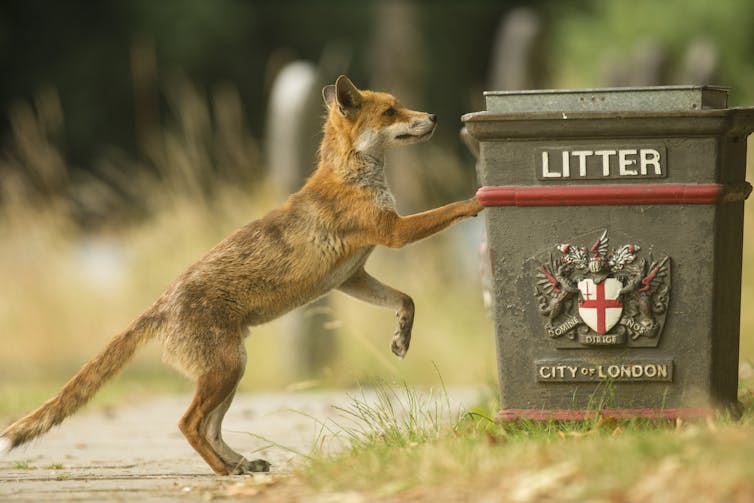
Ever since their colonisation of British cities sometime during the last century, urban red foxes (Vulpes vulpes) have become somewhat of a cultural phenomenon. Some people love them for their striking marmalade coats but others, including former prime minister Boris Johnson, think of them as a menace.
In recent times, people seem to think urban foxes are becoming bolder and more cunning, “wreaking havoc in central London” by scavenging in bins for food scraps. But our recent study suggests that this popular portrayal may only be partially true for the species.
Cities are dynamic places. The people, traffic, smells, noises and opportunities for food are constantly changing. This, in theory, should be ideal for bolder animals who would have the confidence to exploit resources like outdoor bins, for instance, despite the risk of coming into conflict with humans. Cunning animals would also be good at learning to push, pull or lift human-made materials such as bin lids and food containers to extract discarded food.
In our recent study, we tested whether urban foxes have indeed become bolder and more cunning by comparing them to their countryside cousins. We gave a series of puzzle feeders to foxes in 104 urban and rural locations across a large area, from London to Edinburgh, and left them in place for two weeks. The food inside each puzzle could be released through simple actions such as removing lids or pulling sticks to dislodge food from pipes.
Playing for your food
Across all of our study locations, 96 foxes acknowledged the objects, most of which showed an initial avoidance of the puzzles. Around a third (31) touched the puzzles, but only 12 of those foxes persisted long enough to extract the food. We found urban foxes were more likely to interact with the puzzles than rural ones, suggesting they were bolder.
However, when it came to their willingness to solve the puzzles, there was no difference between the two populations. The lack of persistence we recorded during our research, even for puzzles containing large rewards (90 dog biscuits), contradicts the notion that urban foxes regularly exploit another type of puzzle that humans leave out – household waste bins.
To confirm that foxes were interested in the food but lacked the motivation to exploit the puzzle contents, we returned to some of our study locations six months later and left the same food on the ground without a puzzle. All of these foxes ate the food without hesitation.
So, while some foxes do indeed raid bins, our findings suggest that perhaps this doesn’t happen as often as people might think due to foxes’ aversion to risk and effort. Instead, this belief about city foxes may come from accounts from specific populations or highly publicised cases, but not from urban foxes in general.

Our experimental study is consistent with findings from other research on fox diet, direct observations of urban foxes, and household surveys, all of which indicate that the notion of foxes as prolific bin raiders is not typical of the species. Other factors beyond boldness may lead some foxes to rummage through bins, such as when containers have no lids or when they lack barriers to block access, which we are investigating in follow-up studies.
What does this mean for foxes and people?
Foxes are ecologically important to urban green spaces, so people need to find ways of living amicably alongside them. Indeed, by simply disposing of our waste properly, for example, we can discourage many of them from hanging around our bins.
Foxes are one of the most widespread carnivores on the planet and urban sprawl grew by 45% from 1990-2014, and keeps increasing. So it’s getting harder for foxes and humans to avoid each other.
At the moment, surveys show foxes are currently one of the most beloved mammals in the UK, but this could change as they become bolder due to greater opportunities for conflict with people. Our study and others, however, show the importance of having objective data to guide public perceptions about a species as their portrayal within popular culture may not always be rooted in reality.

Don’t have time to read about climate change as much as you’d like?
Get a weekly roundup in your inbox instead. Every Wednesday, The Conversation’s environment editor writes Imagine, a short email that goes a little deeper into just one climate issue. Join the 20,000+ readers who’ve subscribed so far.
Dr Morton's research was funded by grants from NERC and the University of Hull.
Kristy Adaway does not work for, consult, own shares in or receive funding from any company or organisation that would benefit from this article, and has disclosed no relevant affiliations beyond their academic appointment.
This article was originally published on The Conversation. Read the original article.







